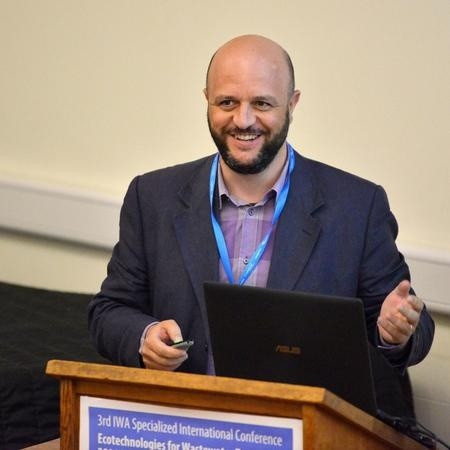Circularizing Carbon Solutions in the Municipal Sector: Replacing Methanol with Biodegradable (Compostable) Plastics as Carbon Source for Biological Nutrient Removal from Wastewater
Partners: NEWHub Corp, Municipality of Middlesex Centre
This project explored how compostable plastics—the same kind used in some food packaging —can be used to make wastewater treatment more sustainable. Typically, wastewater plants rely on methanol, a fossil fuel, to help remove harmful nutrients like nitrogen and phosphorus from water. While effective, methanol is flammable, expensive, and contributes to greenhouse gas emissions.
Instead, the research team tested biodegradable plastics such as polycaprolactone (PCL) as an alternative. These plastics slowly dissolve in wastewater, releasing organic material that “feeds” helpful bacteria responsible for cleaning the water. The team found that warmer temperatures and higher surface areas made the plastics dissolve more effectively, and that real wastewater helped speed up the process even more. The plastics performed well over time, offering a safer, greener substitute for methanol.
This work also helped connect two major environmental goals: reducing plastic waste and lowering emissions from water treatment. The project trained new researchers, led to a scientific publication, and laid the groundwork for a pilot demonstration with the Municipality of Middlesex Centre. In the future, these biodegradable materials could be used in rural and small-town treatment systems across Canada—turning waste into a solution for cleaner water and a healthier planet.
Researcher Biographies
Domenico Santoro
 Adjunct Research Professor
Adjunct Research Professor
Team Leader, Advanced Modeling & Optimization Team, Trojan Technologies
Domenico Santoro completed his BSc/MSc in Civil/Environmental Engineering at the University of Rome, La Sapienza (Italy) in 2001 specializing in water and wastewater treatment. Subsequently, he received his Ph.D. in the Department of Environmental Engineering & Sustainability at the Politecnico di Bari (Italy) conducting research on advanced disinfection for wastewater reuse. His Ph.D. dissertation, entitled “Computational Fluid Dynamics (CFD) Modelling of Wastewater Disinfection Processes by Peroxyacetic Acid (PAA)”, paved the way for a broader adoption of PAA as an environmentally-friendly disinfectant for municipal water and wastewater treatment. Currently, Dr. Santoro holds a dual appointment as Senior Research Scientist at Trojan Technologies (London, ON – Canada) and Adjunct Research Professor in the Department of Chemical and Biochemical Engineering at the University of Western Ontario. His main responsibilities include scientific investigation and development of novel water treatment processes and technologies, with a focus on disinfection and advanced oxidation for drinking water, wastewater and reuse applications. More recently, he has expanded his research interests into the field of resource recovery and holistic wastewater resource management. He has also been very active in initiating and leading research collaborations at the global scale, including work with partners from Canada, Europe, China, Australia and USA.
Lars Rehmann
Professor at The University of Western Ontario and Visiting Professor at RWTH Aachen (Germany)
- NSERC Post-Doctoral Fellow (University of Manchester) 2007-2009
- Ph.D. Chemical Engineering (Queen's University, Canada)
- Diplom Biotechnologie (T.U. Braunschweig, Germany) 2002
Current research focuses on the production of bio-fuels and value added chemicals through biochemical conversion processes. The research is highly interdisciplinary and there are occasional openings for new graduate students.

